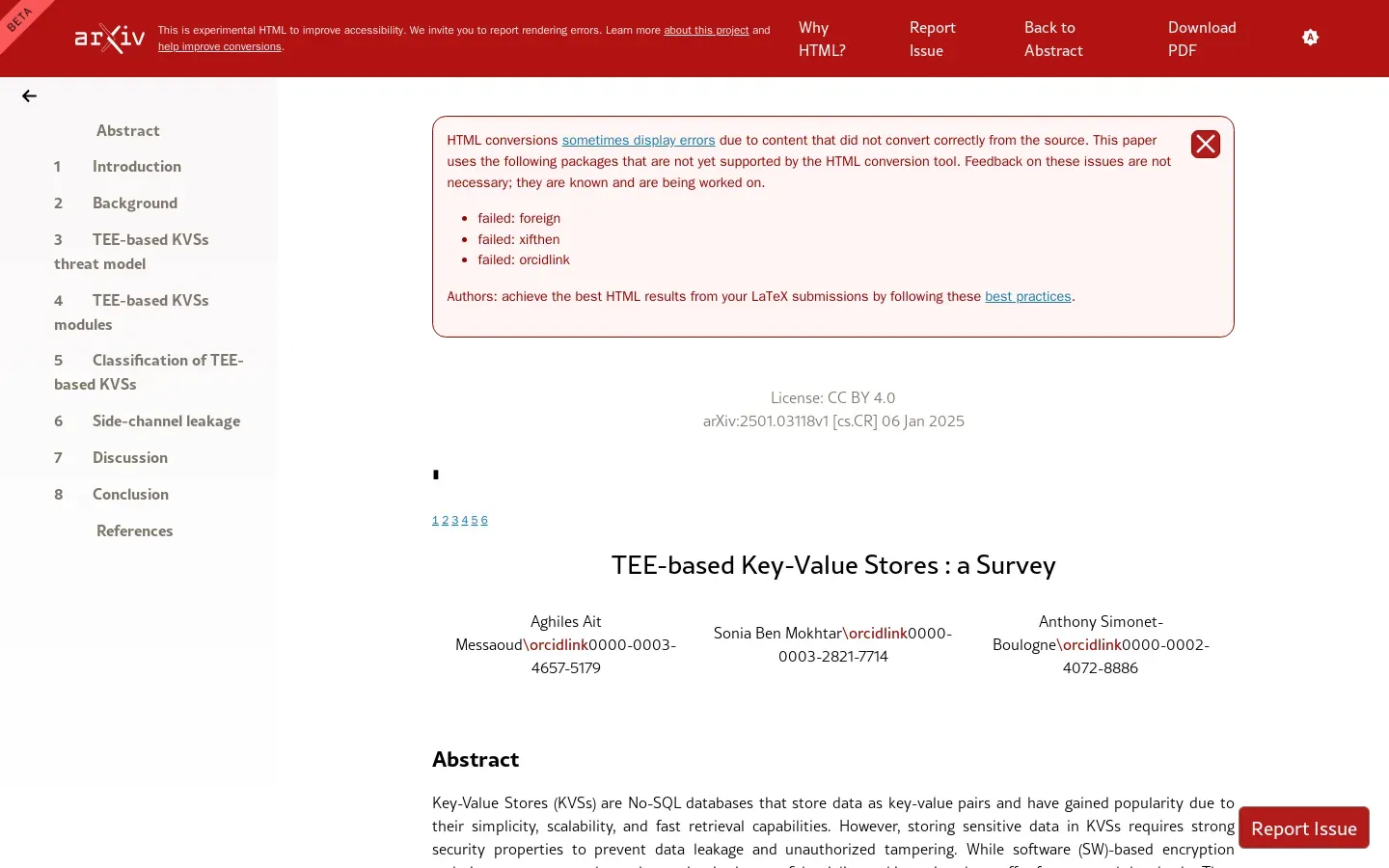
Survey of TEE-based Key-Value Stores in Cybersecurity
/ 4 min read
Quick take - Researchers have investigated the use of Trusted Execution Environments (TEEs) to improve the security of Key-Value Stores (KVSs), focusing on Intel Software Guard Extensions (SGX) to address challenges related to data confidentiality, integrity, and performance in cloud and distributed systems.
Fast Facts
- Research Focus: The study investigates the use of Trusted Execution Environments (TEEs), particularly Intel SGX, to improve the security of Key-Value Stores (KVSs) in cloud and distributed systems.
- Key Findings: Enhanced security protocols were developed to mitigate side-channel attacks, real-time threat detection mechanisms were integrated, and the potential for blockchain integration was explored to improve data integrity.
- Methodology: The research involved threat model formalization, scalable SGX architecture development, and analysis of existing TEE-based KVS implementations, utilizing tools like SPDK and the Paxos Consensus Algorithm.
- Implications: Leveraging TEE technologies can significantly enhance data protection in untrusted environments, addressing vulnerabilities from both insider and external threats, particularly in cloud services.
- Future Directions: Further research is needed on performance-security trade-offs, resilience against Byzantine failures, and the development of modular architectures for more scalable KVS solutions.
In an era where data breaches and cyberattacks have become alarmingly prevalent, the need for robust security mechanisms has never been more pressing. Enter Trusted Execution Environments (TEEs), particularly Intel’s Software Guard Extensions (SGX), which provide a fortified sanctuary for sensitive computations within otherwise untrusted systems. The potential applications of SGX in Key-Value Stores (KVSs)—a popular data storage paradigm—are not just theoretical; they hold significant promise for enhancing cybersecurity. Recent research has unveiled critical insights into how TEEs can bolster the integrity and confidentiality of data, shedding light on both practical applications and theoretical implications.
One of the standout findings from this research is the real-time threat detection and response capability that SGX-based KVSs can offer. By leveraging secure enclaves, organizations can better monitor their environments for malicious activity and respond instantaneously, thereby minimizing potential damage. This proactive approach contrasts sharply with traditional methods that often prioritize reactive measures after a breach has occurred, underscoring a paradigm shift towards anticipating and neutralizing threats before they escalate.
The analysis also addressed the scalable architectures that SGX can facilitate for large-scale applications. As organizations increasingly rely on vast amounts of data, the challenge lies in efficiently managing and securing it without sacrificing performance. The integration of TEEs into KVSs allows for enhanced data confidentiality while simultaneously optimizing for speed through techniques like asynchronous I/O operations. This dual focus on performance and security is crucial in an age where user expectations demand rapid response times alongside stringent data protection.
An equally important aspect of the research concerns the mitigation of side-channel attacks (SCAs), which have emerged as a significant threat to secure enclaves. These attacks exploit indirect channels to gain unauthorized access to sensitive information, making it imperative for security protocols to evolve continuously. Strategies such as controlled-channel analysis and cache attack prevention are being explored to reinforce defenses against these vulnerabilities, ensuring that sensitive computations remain confidential and intact.
Furthermore, the exploration of blockchain technology within SGX-based KVSs presents an exciting avenue for enhancing data integrity. By incorporating immutable ledgers into data management frameworks, organizations can ensure that any alterations to data are transparently recorded, thereby bolstering trust in cloud services and decentralized applications. This intersection of blockchain with TEEs not only addresses concerns about data tampering but also reinforces the overall resilience of distributed systems against various threats.
Yet, despite these advancements, the research identifies several limitations and areas demanding further investigation. While current implementations showcase promising results, challenges remain in achieving optimal performance without compromising security. The trade-offs between these two elements are crucial considerations as organizations strive to implement effective TEE-based KVS solutions in real-world settings.
Looking ahead, one of the most compelling directions involves integrating federated learning systems with SGX-based KVSs. This could pave the way for enhanced privacy protections while enabling collaborative machine learning across disparate datasets without exposing sensitive information—a game changer for industries handling personal or proprietary data.
As we continue to navigate an increasingly complex cybersecurity landscape, the findings surrounding SGX-based Key-Value Stores highlight both remarkable progress and ongoing challenges in securing our digital infrastructures. The future promises a deeper exploration into advanced security protocols tailored for multi-cloud environments and innovative strategies aimed at overcoming existing limitations in TEE technologies. With every breakthrough, we edge closer to realizing a safer digital ecosystem where trust is not just assumed but assured through robust technological frameworks.



